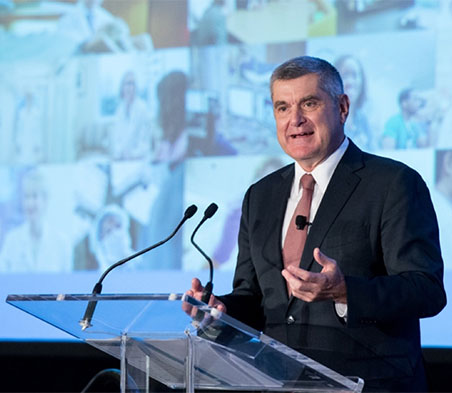Advocacy
Focus Areas

What Can We Do About Healthcare?
Endless talking about the broken state of our healthcare system doesn’t help drive change. What does help is innovation and collaboration.
By Amy R. Partridge Published: 10/23/2017
While the Westchester County Association’s 4th annual HealthTech conference earlier this month was jam-packed with insights from medical professionals and technology innovators, it was a mom who stole the show. Ardsley attorney Stephanie Marquesano, who runs a nonprofit advocacy group focused on working with young addicts who have co-occurring mental health disorders, shared the powerful tale of losing her 19-year-old son, Harris, to an accidental drug overdose in 2013. Marquesano launched her advocacy group, called the harris project, at his funeral, she told the crowd of roughly 200 attendees.
The harris project advocates a sweeping change in the way we approach opioid addiction and treatment. For too many years, Marquesano explained, the funding and focus has been on “more beds [in treatment centers] and longer treatment” — which, she said, “is clearly not working.” How does it make sense, she asked, “to send kids to detox without looking at the mental health issues” that are often at the root of the addiction? Instead, the harris project aims to raise awareness of co-occurring mental health disorders by work with young people on erasing the stigma associated with mental health and addiction issues.
Bringing to light innovative approaches such as Marquesano’s is the aim of the Westchester County Association’s HealthTech conference. Now in its fourth year and earning a reputation as a must-attend regional healthcare event, the October 12 summit also disseminated thought-provoking insights on cancer treatment, telemedicine, and health care policy.
Here are some highlights:
Referring to the current private- vs public-payer-system policy debate, morning keynote speaker M. Beatrice Grause, president of the Healthcare Association of New York (HANYS), explained that this thinking ends up only making patients “victims” and does nothing to solve long-term policy challenges. Pitting these two opposing views does not take into account the underlying economic and demographic conditions that complicate our healthcare system. We need to change our current system, Grause said, but likened doing this to “trying to fix an airplane while flying it.”
Westchester is at the forefront when it comes to advances in telemedicine, which was once considered a next-gen strategy but is rapidly becoming a vital part of effective patient care. Panelists from White Plains Hospital, WMC Health, Sloan Kettering, and MediSprout (a communications platform for facilitating telemedicine) shared insights on the far-reaching power of telemedicine in a disparate range of specialties, from oncology to rheumatology, and even for use in planning surgeries to separate conjoined twins.
It’s a simple question with a terribly complicated answer, explained luncheon keynote speaker, Dr. Craig Thompson, president and CEO of Memorial Sloan Kettering Cancer Center (MSKCC). He pointed to environmental factors — “Cancer is not inherited; it’s an environmental disease caused by environmental exposure to carcinogens.” — and obesity — “The American diet of carbohydrates derived from simple sugars and unreasonable meal sizes coupled with a sedentary lifestyle equal a ticking time bomb.” — as the main culprits. Specialty providers like MSKCC (which now operates a 114,000 square foot outpatient treatment center in West Harrison) are most effective, he noted, because cancer is the main focus both in terms of treatment and research. “Everyone is assigned a team here, and the team is optimized by making use of everyone’s skills,” Thompson explained. In addition, he noted that MSKCC is not in Westchester to compete with other medical providers, but to partner with them in order to achieve the best outcomes for patients. “We’re about cancer specialization but we need to be partners with others as patients get other diseases,” he said.